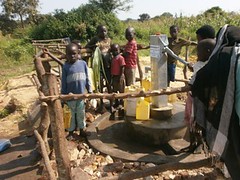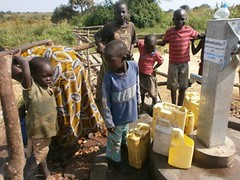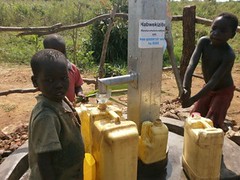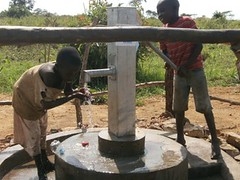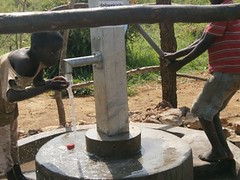Construction is underway for a new hand-dug well in the village of Kitaleba, Uganda. The report below from our partner in the field gives some great information about the village and the progress of the project:
Kitaleba is TWT’s third village in Miirya sub-county. TWT recently expanded its operations in Masindi District to this area. Kitaleba is a traditional farmer’s community. Many people in Kitaleba grow maize. Masindi District is also the second biggest producer of maize in the whole country!
Besides working in the garden, people gather in the evenings to socialize. "We meet every evening, and we talk about football and life," says a teenager. The problem in Kitaleba is clean water and the poor health of many community members. "Many people get sick of our water," says the chairman. "This water source will greatly improve our community. Especially as TWT also focuses on improving the sanitation and hygiene diseases will reduce."
Construction Progress:
September 9, 2012
This week the technician was transferred to Kitaleba. We are at the beginning stages of construction. Currently we are at 2 ft.
September 19, 2012
The technician has only been moved last week and we are already at 12 ft! Excavation is going very fast as the community is supporting the techinician with digging.
October 2, 2012
Currently, we are at 16 ft and we have struck water. Sand, stones and bricks have been brought to the construction site.
October 4, 2012
The site is moving forward. The depth of the well is currently 19 ft. The community is very active in the construction of the well.
Sanitation and Hygiene Progress:
TWT’s social program includes the assignment of one Community Development Officer (CDO) to one village. The CDO encourages each households to build an ideal homestead that includes: a latrine, hand-washing facility, a separate structure for animals, rubbish pit and drying rack for dishes.
Although the main objectives of TWT’s Sanitation and Hygiene Program are the use of latrines and proper hygiene, these goals are inherently connected to the provision of clean water. Open defecation, water storage in unclean containers and the absence of hand washing are all possible contaminators of a household water source. TWT leverages this relationship, by requiring each village to achieve Open Defecation Free statis (defined by one latrine per households), prior to the pump installation for a shallow hand dug well. Using the immediate gratification of clean water as an impetus, TWT works toward sustainable, interdisciplinary WASH development.


 Rehabilitation Project
Rehabilitation Project








